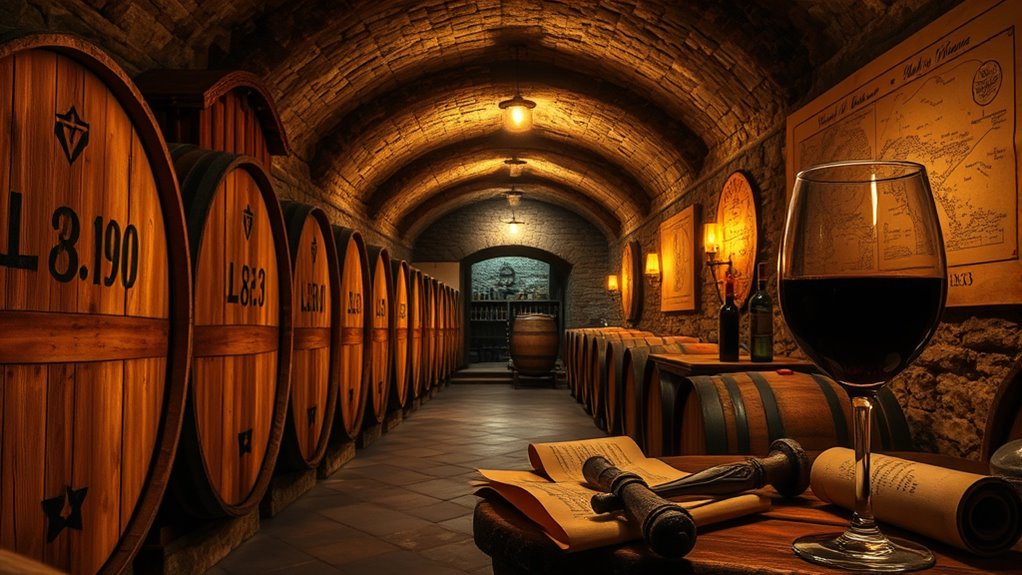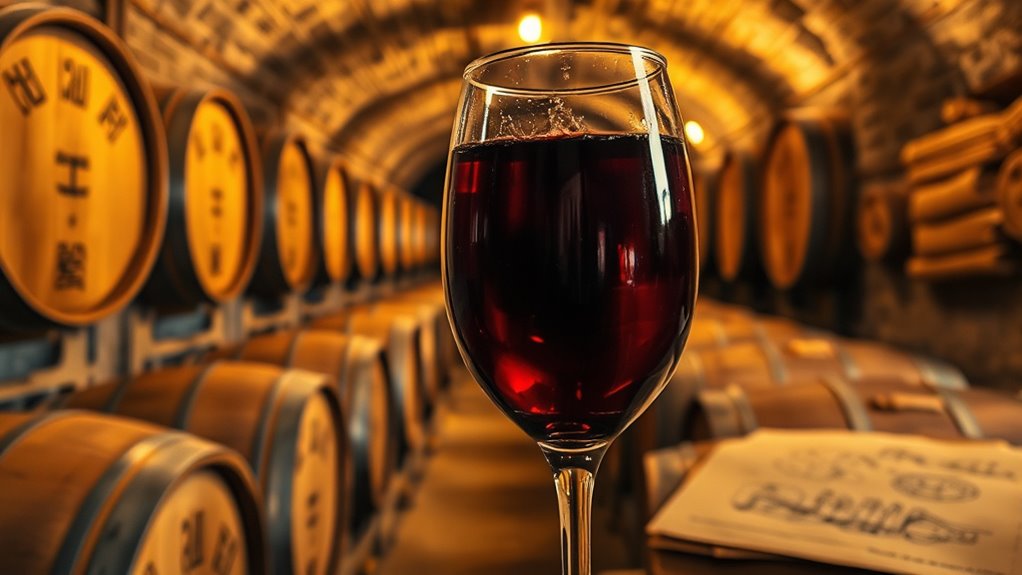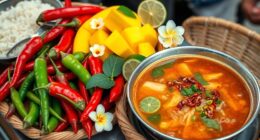The history of wine spans thousands of years, beginning around 6,000 BCE in regions like Georgia and Iran, where humans first discovered fermentation. Ancient civilizations, such as Egypt and Greece, valued wine for religious, social, and cultural reasons. Romans expanded production and shared winemaking techniques that still influence us today. During the Middle Ages, monasteries preserved wine traditions, and later advancements improved storage and practices. To uncover how this centuries-old tradition evolved into the modern beverage you enjoy, explore further.
Key Takeaways
- Wine originated around 6,000 BCE in Georgia and Iran, discovered through accidental fermentation by early humans.
- Ancient Egyptians associated wine with gods, wealth, and religious rituals, cultivating vineyards along the Nile.
- Greeks popularized wine in social and philosophical gatherings called symposiums, shaping early wine culture.
- Romans expanded wine production, refining blending and aging techniques, and spreading winemaking knowledge across Europe.
- Medieval monasteries preserved and improved winemaking practices, influencing modern techniques and the cultural significance of wine today.

Have you ever wondered how wine has become such a cherished part of human culture? It’s a beverage that spans thousands of years, weaving its way through history as both a symbol of celebration and a daily pleasure. The story begins in ancient times, where evidence suggests that early humans discovered the art of fermentation by accident. Around 6,000 BCE, in regions that are now Georgia and Iran, people started fermenting grapes naturally, creating the first primitive wines. These early wines weren’t just for drinking; they played a role in religious rituals, social gatherings, and even medicinal practices.
Wine’s origins date back to ancient times, when early humans accidentally discovered fermentation around 6,000 BCE.
As civilizations grew, so did their appreciation for wine’s ability to enhance communal bonds and elevate spiritual experiences. In ancient Egypt, wine became a sign of wealth and power, often associated with gods and pharaohs. The Egyptians developed techniques to cultivate vineyards along the Nile, and they stored wine in ornate jars, sometimes sealing them with wax or clay. Their society deeply valued wine, using it in offerings to gods and in funerary rituals to honor the deceased.
Meanwhile, in Greece, wine took on a new dimension. The Greeks not only appreciated its intoxicating effects but also celebrated it as a crucial part of social life, philosophy, and culture. They invented the concept of symposiums—gatherings where men drank wine, discussed ideas, and enjoyed entertainment. The Greeks also refined winemaking techniques, spreading their knowledge across the Mediterranean.
The Romans further elevated wine’s status, making it more accessible to the masses. They built extensive vineyards and improved storage methods, ensuring wine could be transported and enjoyed across the empire. Romans also experimented with blending and aging, laying the groundwork for many modern winemaking practices.
As the Roman Empire declined, wine production persisted in monasteries during the Middle Ages. Monks meticulously cultivated vineyards, improving quality and developing new styles. Their efforts helped preserve winemaking traditions through turbulent times.
During the Renaissance and into modern history, wine continued to evolve alongside advances in science and technology. The discovery of cork and glass bottles revolutionized storage, allowing wine to age gracefully. Today, wine’s history is a testament to human ingenuity, cultural exchange, and a shared love that transcends borders.
From its humble beginnings in ancient vineyards to the sophisticated wines we enjoy now, wine remains a vibrant part of our collective heritage. Its journey reflects centuries of tradition, innovation, and passion—making every sip a connection to our past. Additionally, the development of digital platforms has expanded access to wine education and tasting experiences worldwide.
Frequently Asked Questions
How Did Ancient Civilizations Influence Modern Winemaking Techniques?
Ancient civilizations laid the foundation for modern winemaking by developing fermentation techniques, selecting grape varieties, and understanding vineyard management.
You benefit from their innovations, like using clay vessels and early blending practices. They also established trade routes, spreading wine culture worldwide.
These historical practices influence your choices today, guiding vineyard practices, winemaking methods, and even tasting traditions that continue to evolve from those early innovations.
What Are the Earliest Known Wine Recipes or Formulas?
You might find that the earliest known wine recipes come from ancient Mesopotamian and Egyptian texts, dating back over 4,000 years. These early formulas often involved fermenting crushed grapes or other fruits with water and sometimes honey or spices.
You can see that fermentation process was well understood, laying the foundation for modern winemaking techniques. These recipes reveal how early civilizations experimented with ingredients to create wine.
How Has Wine Production Evolved With Technological Advancements?
Think of wine production like a symphony that grows more complex with each technological note. You’ve seen innovations like temperature-controlled fermentation, automated bottling, and precision viticulture revolutionize the process.
These advancements improve quality, consistency, and efficiency. You now have tools to monitor grape health, optimize yields, and craft unique flavors.
Technology turns the art of winemaking into a finely tuned science, enabling you to produce better wines faster and more sustainably.
What Cultural Rituals Are Associated With Wine Throughout History?
You observe that wine has played a key role in many cultural rituals throughout history. From ancient Greek symposia to Roman banquets, you see that wine symbolizes celebration, social bonding, and spiritual offerings.
In religious ceremonies, you notice wine often represents sacredness or divine presence.
Throughout different eras, you recognize that these rituals reinforce community bonds, honor traditions, and elevate special occasions, making wine an integral part of cultural identity.
How Did Trade Routes Impact the Spread of Wine Globally?
Trade routes act like essential veins, pumping wine across continents and cultures. Through these pathways, you witness vineyards transforming into global treasures, spreading flavors and traditions.
As merchants carry bottles on their journeys, wine’s story unfolds across deserts, seas, and mountains. This interconnected web of trade ignites cultural exchanges, blending tastes and rituals into a rich tapestry.
You see how trade routes shape wine’s journey, uniting distant lands with every shared sip.
Conclusion
As you explore the history of wine, remember it’s more than just a drink—it’s a story of culture, innovation, and tradition. Imagine visiting a vineyard in France where winemakers blend ancient techniques with modern science, creating a wine that’s a true reflection of history. Whether you’re sipping a glass now or just appreciating its past, wine connects you to centuries of human ingenuity and shared experience. Cheers to discovering its timeless story!









